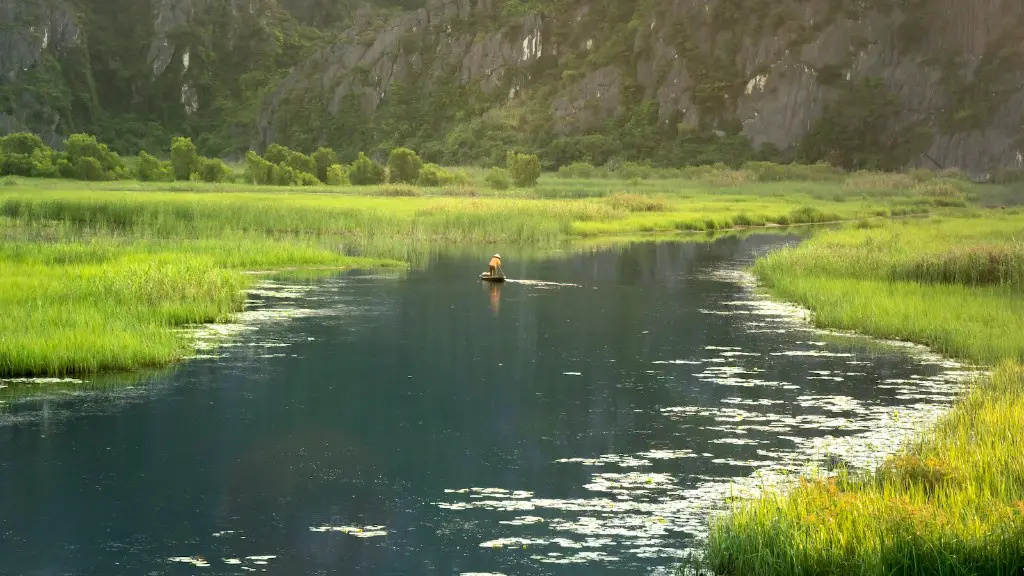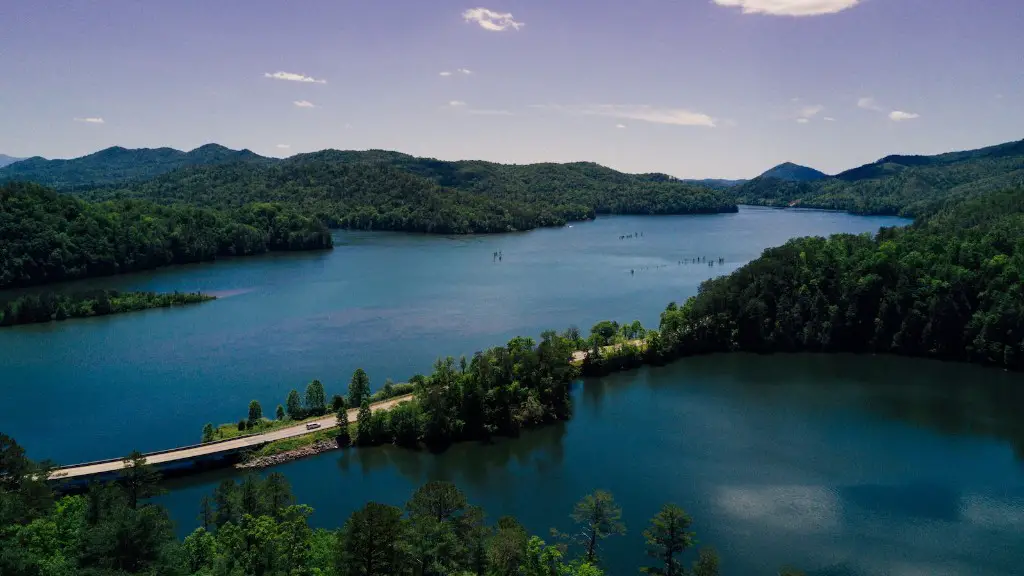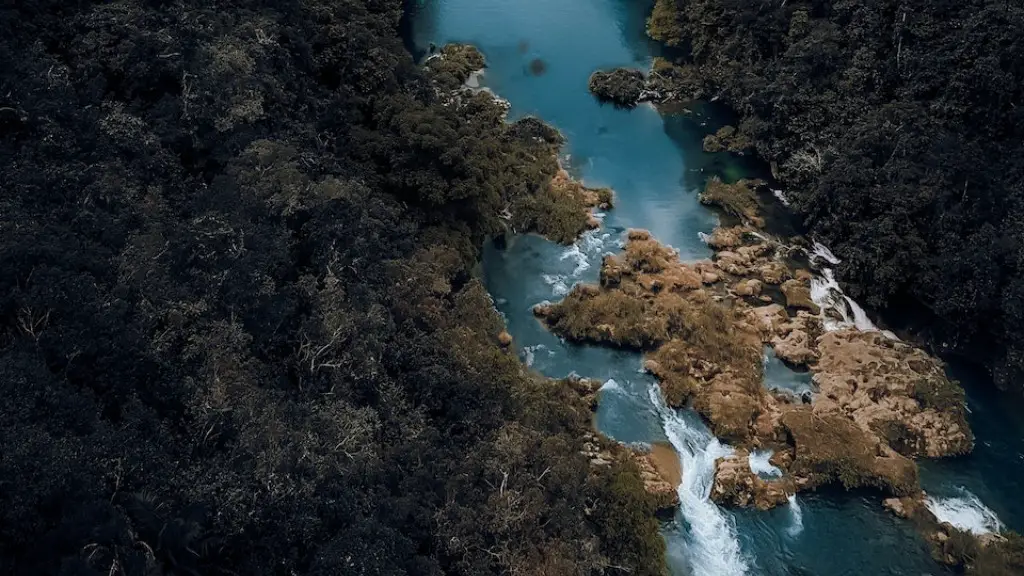Overview of the Mississippi River
The Mississippi River is the second-longest river in North America, stretching from Minnesota to Louisiana. It covers a drainage basin of more than 1.2 million square miles, feeding into the Gulf of Mexico. The river is a significant source of water for recreation, power, and navigation for people living in the United States. The river is known for its rich history and diverse wildlife, and it’s home to a number of different species, as well as being a commercial fisheries hub.
Environmental Impact of the Mississippi River
The environment of the Mississippi River is highly impacted by human activity and the river’s many uses. The river is subject to high levels of pollution, particularly due to agricultural runoff and urban sewage. Additionally, the river’s flow and depth is highly affected by commercial, recreational, and industrial activities. As a result, many aquatic species, including frogs and fish, as well as many plants, are at risk due to the decline in water quality.
The Role of the Army Corps of Engineers
The Army Corps of Engineers is responsible for much of the water management along the Mississippi River. The Army Corps of Engineers utilizes a variety of strategies in order to maintain the river and the ecosystem surrounding it. As part of their strategy, the Corps has been working to reduce the amount of sediment and silt that is released into the river from upstream sources. They also use water pumps to maintain a stable water flow. The Corps also works to protect the river from flooding, by constructing flood control measures such as levees, as well as dredging and deepening the river so that water can flow more easily.
What Can Be Done?
The question of how to improve the environmental impact of the Mississippi River is a difficult one. However, there are some solutions that can be implemented in order to improve the health and sustainability of the river. One way to do this is by implementing regulations to reduce agricultural runoff, as well as better waste management and monitoring of water quality. Additionally, it is important to restore nutrient-rich wetlands along the river’s banks, as these can help to improve and maintain healthy aquatic habitats. Finally, it is also important to conserve water resources, in order to reduce the amount of water that is withdrawn from the river each day.
Economic Benefits of the Mississippi River
The Mississippi River provides a number of economic benefits to those living in the United States. The river is a major transportation hub for goods, as it feeds directly into the Gulf of Mexico. Additionally, the river is a major source of power, providing electricity to thousands of people each day. Finally, the river is used extensively for recreational activities, such as fishing and boating, which brings in significant tourism revenue for states along the river.
Conclusion
The Mississippi River is an important part of the United States, providing water to millions of people, as well as economic and recreational benefits. However, the health of the river is threatened by human activities, resulting in harmful levels of pollution and sediment. In order to improve the health and sustainability of the river, it is necessary to implement solutions to reduce the environmental impact of the river, such as reducing agricultural runoff and better waste management. Additionally, efforts must be made to conserve water resources, restore nutrient-rich wetlands, and monitor water quality.
Flood Control Measures
One of the most important tasks for the Mississippi River is Flood Control Measures. The army corps of engineers are responsible for managing the water flow and to make sure that the banks of the river do not become flooded. This involves building levees, deepening the river and building floodplain reservoirs for when the river overflows its banks.
Environmental Preservation
In order to preserve the environmental health of the Mississippi River, a number of measures have been taken by the Environmental Protection Agency (EPA). The EPA works to reduce pollution levels in the river by making sure industries and cities are in compliance with their wastewater discharge permits. They also work to reduce agricultural runoff by implementing best management practices and programs. In addition, the EPA works to protect fish and other aquatic species from being harmed by the pollution in the river.
Recreational Use of the Mississippi River
The Mississippi River is a popular recreational spot for both locals and tourists. The river provides a great opportunity for fishing, boating, and other forms of recreation. In addition, it is well known for its scenic views and the many towns and cities that line the riverbanks. The recreational use of the river provides economic benefits to the county and provides additional income to those living in the area.
Impediments to the Health of the Mississippi River
The Mississippi River faces many challenges when it comes to maintaining its environmental health. One of the biggest challenges is coming from agricultural runoff, which is caused by fertilizer runoff from farms. This fertilizer can significantly increase the levels of nitrogen, phosphorus, and other nutrients in the river, resulting in nutrient overload. In addition, urban runoff, caused by cities and other settlements along the river, adds pollutants to the river, resulting in water quality degradation. Finally, many forms of industrial activity occur on and around the river, resulting in increased sedimentation, which can be harmful for the ecological health of the river.
Role of the Government
The government plays an important role in protecting the health of the Mississippi River. They are responsible for enacting and enforcing laws and regulations pertaining to water quality, pollution, and sedimentation. Additionally, the government works to fund and support research and conservation efforts to protect and restore the river’s ecology. Finally, the government works to promote the use of best management practices to reduce the environmental impact of activities along the river.


